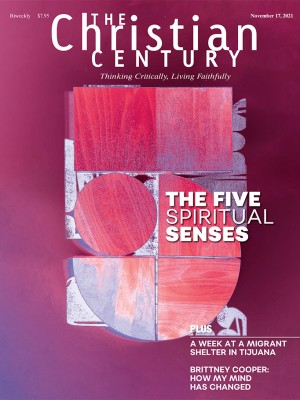December 5, Advent 2C (Luke 3:1-6)
To be wild is to be free, unbought and unbossed by the structures of power.
Rome pulled the strings of life in Jesus’ time and place through a unique iteration of settler colonialism masked by puppet kings and empire-bankrolled priests. God goes around all this to create a pathway of freedom for the people. The God of justice bypasses the game of thrones and disrupts trickle-down religion through a wild man in the middle of nowhere.
Zechariah’s son resigned from his hereditary claim to the priesthood and its iconic regalia, opting for camel-hair clothes and an eccentric diet of roasted locusts and organic honey. According to Henry David Thoreau, “in wildness is the preservation of the world.” This is often misquoted as “wilderness.” But Thoreau uses wildness to refer to an experiential and mental state of human beings, not a geographical phenomenon. John impels us to embrace wildness as a form of human freedom invested in the flourishing of the other.
Read our latest issue or browse back issues.
What if God is calling us to a wild life—not an existence of convenience, settling, respectability, or compliance? The domesticating character of religion can crush us into dust trampled over by the ruling classes or cram us into the miserable mold of a status quo gasping for the rarified air of authenticity. It is an existential tragedy to live high on public compliance but deficient of divine love.
John the Baptizer lives on the wild side. As geographer Rosemary-Claire Collard writes, “A wild life is characterized by openness, possibility, a degree of choice, and self-determination, in which beings are understood to have their own familial, social, and ecological networks, their own lookouts, agendas, and needs.” John shows us that God optimizes the life of folks daring to do life on the wild side.
Advent is a call to go wild for love, integrity, and justice. It endorses a tolerance for waiting, but not at the expense of adventure. We cautiously move through our days too tamed, too domesticated, too programmed to be open to divine intrusions. What if we measured the scope of our spirituality by our experience of the presence of God?
Before the canonization of scripture and massive oral transmission, the faithful possessed only their five senses to access the ways of God. Life with God steers clear of the disempowering, sterilizing, domesticating impositions of religion curated by totalizing groupthink. The existential offerings God longs to receive from the public altars of love flow from transcendent experiences with God, not creedal and doctrinal programming.
The creedalization of faith can crowd out creative encounters, divine embodiment, and spiritual effervescence, leaving us allegiant to parchments of doctrine, burdens of uniformity, and sectarian debates. We occupy pews and pulpits as empty shells dressed to the nines. We stagger into new days with old patterns—tamed by patriarchy, domesticated by Whiteness, programmed by capitalism, disciplined by heterosexism. To be wild is to be free, unbought and unbossed by the structures of power.
The movement of God finds the Baptizer in the wilderness. The imagery of the wilderness dominates the collective imagination as a treacherous context of monsters and death, a dry jungle. The wilderness setting exists independent of imperial power, market values, and religious hegemony. Life is possible in the wilderness when wildness is an article of faith. “Say yes to life and embrace it wherever it is found,” writes James Baldwin. “It is found in terrible places.” Nowhere becomes somewhere when we are there, anchoring our passion for the possible.
The people beat a path to nowhere with John to find themselves, to hear something that elevates their sense of self and of God. Away from the trappings of the society that has poisoned their thinking and contaminated their spirits, John fills the airways of the wilderness with a voice of personal and social liberation. The contagious movement of life transforms a wilderness into a sanctuary.
Nowhere becomes somewhere when we wildly surrender to the mystery of God. This constitutes what Eddie Glaude calls elsewhere, a place where we go to be ourselves radically, to laugh full-bellied laughs, to affirm our imperfections as narrow windows into our widening humanity. We all need to find our elsewhere, our space to breathe freely and act authentically. Elsewhere does not negate the negativity or the transitory quality of the everyday. It bequeaths us the ability to endure with strength. We can all take a trip in the middle of a crisis. Elsewhere equips us to withstand a living hell without capitulating to or being consumed by it.
People of faith benefit from God-saturated places that form our postures of wildness: radical freedom and other-centered service. Enslaved Africans in antebellum America created elsewhere in brush harbors—clearings in the woods dedicated to worship, storytelling, and divine experience beyond the reach and gaze of plantation Christianity. This elsewhere required ingenuity and industriousness to ground these disinherited humans with a tenacious sense of being somebody.
Followers of Jesus have a vocation to become a community of God-conscious and self-conscious explorers of life. In the first year of the reign of Joseph Biden, when Brian Kemp was governor of Georgia and Greg Abbott was governor of Texas, when Keisha Lance Bottoms was mayor of Atlanta and Sylvester Turner was mayor of Houston, during the evangelical priesthood of Robert Jeffress and Franklin Graham, the word of love and justice comes elsewhere. Where is your elsewhere, your place to cultivate a posture of wildness in the name of the God of justice?





